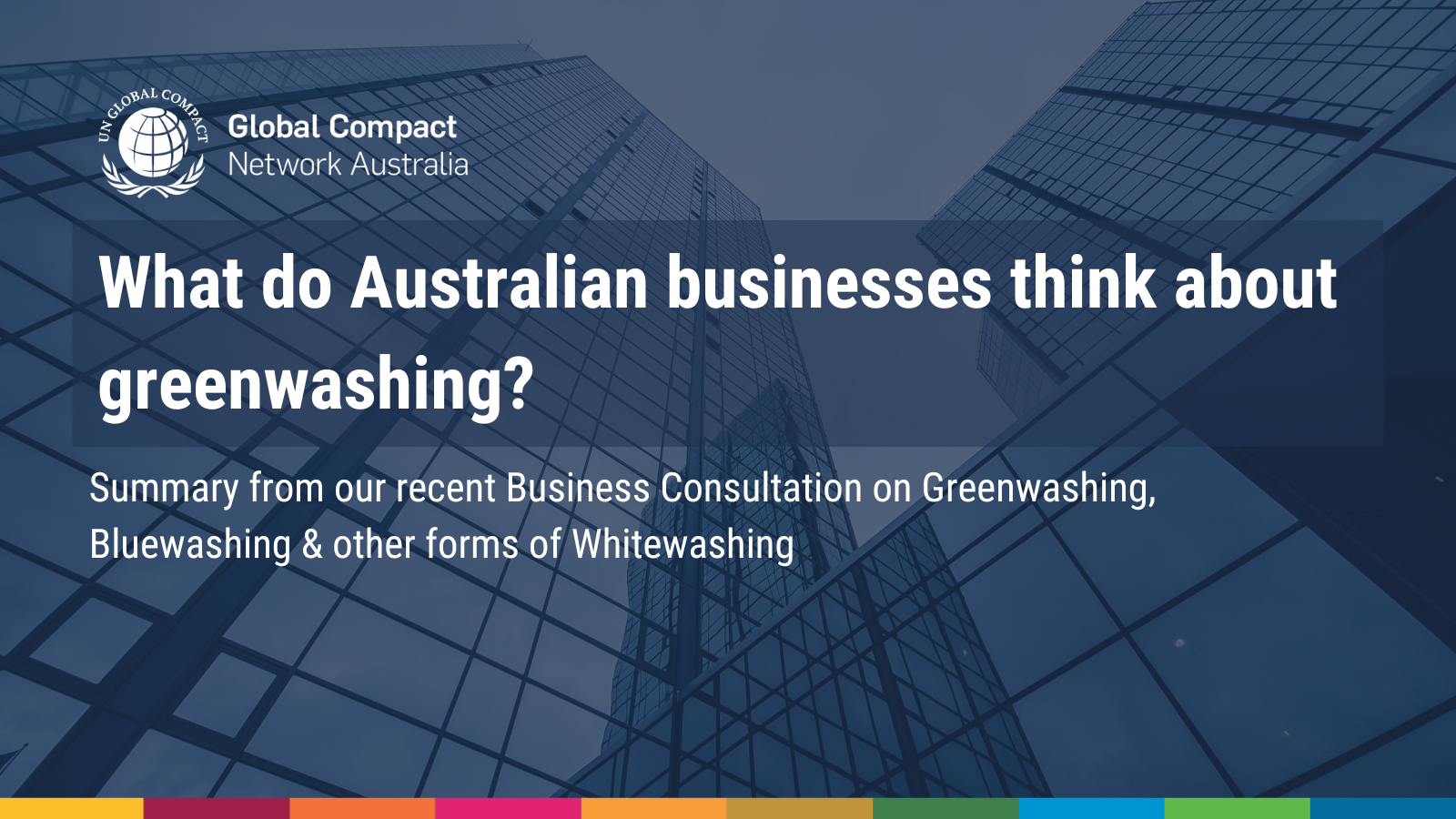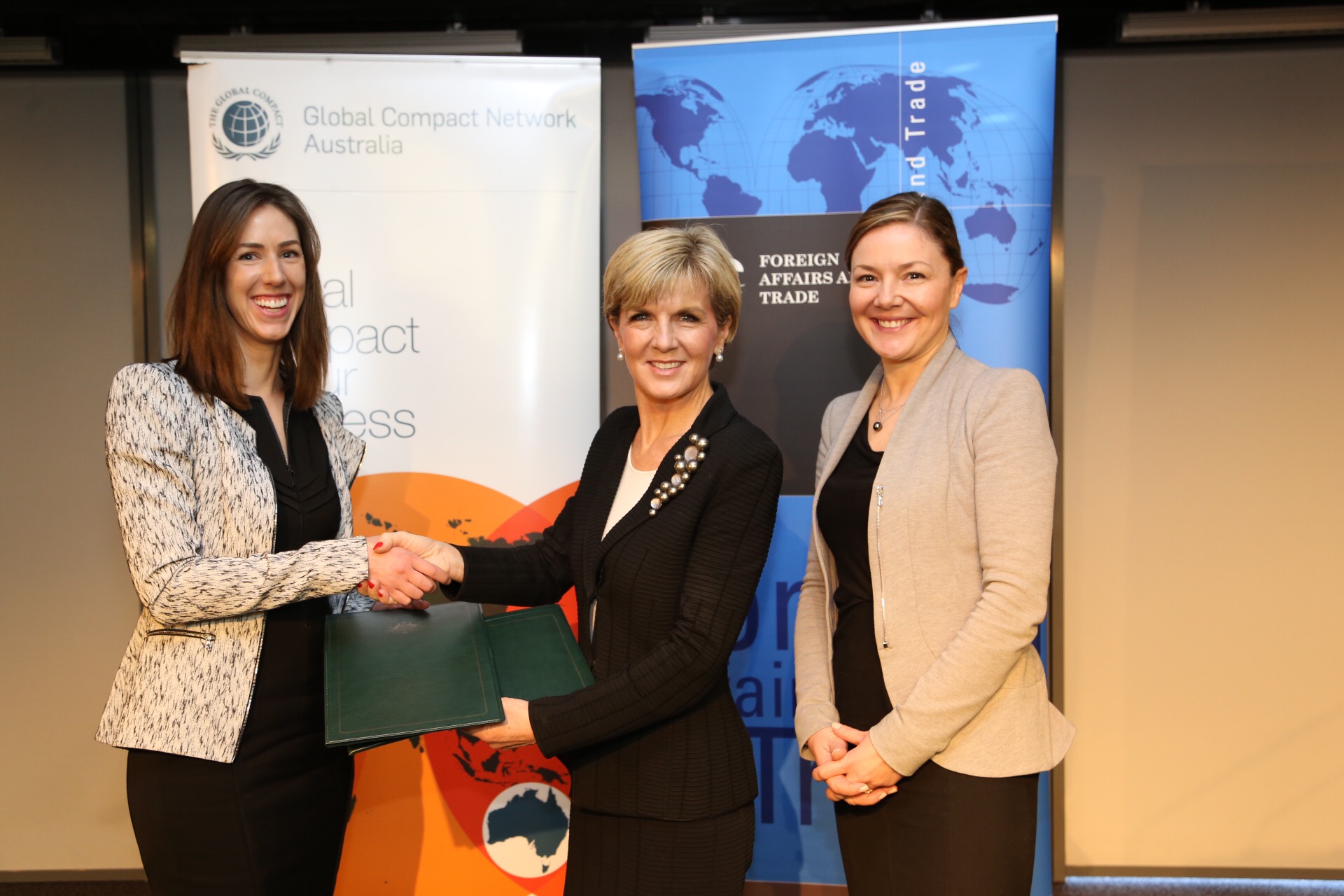
News, Sustainability Governance
SUMMARY | What do Australian businesses think about greenwashing?
Dan Wilcock | May 18, 2023
In recent years, greenwashing has become a highly visible topic arousing widespread public passion. In response, both the Australian Competition and Consumer Commission (ACCC) and the Australian Securities and Investments Commission (ASIC) have identified greenwashing as a current enforcement priority.
A diverse range of Australian businesses recently shared their perspectives on greenwashing, bluewashing and other forms of whitewashing (collectively, “ESG-washing”) as part of a consultation process led by the UN Global Compact Network Australia. Over a dozen Australian businesses – from large, listed companies through to innovative Small and Medium-sized Enterprises (SMEs) – shared their observations, challenges, needs and perspectives in relation to greenwashing issues.
The consultation participants were united by a shared desire to navigate increased demands for ESG information in the market, without falling foul of the regulatory community, or alienating ESG-minded consumers and investors. Businesses are looking for the opportunity to learn from regulators and their peers about best practices in making ESG statements, to help navigate a comparatively new, high-profile and rapidly evolving landscape.
Some key observations from businesses
Businesses can also fall victim to greenwashing, along with other participants in the market. 29% of respondents confirmed that their business had experience with ESG-washing as a consumer of goods, services or inputs. Businesses specifically identified recycling, carbon offsets and net zero claims as areas where they had experienced issues, such as being unable to validate or substantiate claims made by their suppliers.
A number of businesses are simultaneously dealing with ESG-washing issues in both a consumer-facing context, as well as in a reporting or disclosure context. 63% of respondents indicated that they are dealing with ESG-washing issues in both contexts, and 38% indicated they are dealing with these issues in a consumer-facing context only.
There is not yet a consistent responsibility centre for ESG-based statements within organisations. In some cases, a sustainability or ESG team is responsible for preparing statements. In some other organisations, that function lies with marketing/brand/commercial teams. Processes are developing and evolving to collaborate amongst multiple functional areas and to perform review, endorsement and sign-off steps.
Businesses have had mixed experience with certification schemes for ESG issues. 80% of respondents have experience of certification schemes, noting the proliferation of schemes, many of which apply differing standards. Trust in 3rd party schemes was raised as an issue after prominent media reports questioned their effectiveness.
Concerns were expressed about using certification schemes in good faith, but nevertheless ending up under scrutiny for potential ESG-washing. One example raised was the Forest Stewardship Council’s certification of certain entities in Ukraine and Romania, creating supply chain issues for downstream producers using FSC wood. Another example cited was that of organic cotton certificate forgery by certain companies operating in the Global Organic Textile Standard system. In the absence of credible certification for product inputs, SMEs are at a competitive disadvantage because they do not have the ability to invest directly in farmers and input production.
Some businesses feel that there are sector or industry-specific issues relating to ESG-washing. Broad terms, such as “sustainable,” are vague or imprecise and what is needed to credibly adopt such terminology will vary between industries (eg apparel, mining, architecture). Industry standards for certain claims could be helpful. The quantification of scope 3 emissions was another area identified as potentially benefitting from the development of industry-specific guidelines (eg for retailers working to calculate and reduce customer use emissions).
Greenhushing exists. 93% of respondents indicated that they have experienced discussion around green-hushing within their business. Increased regulator scrutiny can have the effect of reducing the level of ambition for forward-looking ESG goals. Most businesses are trying to do the right thing, which can include the response of pulling right back on communications about ESG topics as a risk mitigation response. One reason for greenhushing is a perception that enforcers are relentless in pursuit of their priorities and not being reasonable. It was also observed that simply responding to complaints – whether or not well-founded – ties up business resources, reducing the capacity to focus on the substantive ESG issues that a business is trying to achieve.
Views on the regulation of ESG-washing
Recognise that we are amid a transition period. Most businesses want to do the right thing. ESG topics, such as climate accounting for businesses, are new to many organisations and can be very complex. Added to that, there is currently a capacity gap in the market for ESG expertise. This is a period of learning by doing and inevitably some mistakes will be made, both in the substantive work and in communications about that work. Businesses would welcome a collaborative approach from regulators during this transition period, noting that an aggressive enforcement posture could be counterproductive to the goal of information transparency.
More guidance is needed for businesses. Respondents indicated a strong appetite for up-to-date technical guidance as a matter of high priority. Businesses would like clear guidance from regulators to ensure that they can prepare and make ESG claims in compliance with the legislative framework and enforcement policy. Uncertainties about liability risks could undermine the movement towards greater transparency in the market about ESG issues.
Good reference resources can also help avoid exaggerated or overly optimistic ESG statements and ensure that ESG statements have reasonable grounds and correlate with the facts on the ground. Authoritative resources can equip relevant business staff to “push back” internally where there is poor understanding of ESG issues, or varying perspectives on the communication approach from different parts of an organisation.
It would be helpful if guidance documents could address:
- What constitutes reasonable grounds or “safe harbours” for particular types of claims – eg what substantiation would be required to confidently make certain types of ESG statements.
- Identify examples of good practice in ESG statements and accurate use of terminology in complex areas.Beyond general principles, ESG and marketing staff would benefit fromhaving access to a range of best practice examples which might be applicable, or tailored, to their particular circumstances. Eg what are acceptable ways businesses have communicated about transition plans for GHG emissions, or other inherently forward-looking statements? Such examples could equip ESG staff to make constructive alternative suggestions to marketing staff, thereby avoiding the use of broader, vague or unqualified claims and statements.
- Identification of discouraged or prohibited claims. Some ESG terms may be too broad or vague to be capable of bearing a useful meaning. Where possible, businesses want guidance on “safe harbours” to use a certain term, however, there may be some terms that are so broad (eg “sustainable”) that their use should be prima facie discouraged or prohibited.
- The importance of “overall impression.” Guidance should emphasise that no matter how carefully the wording of ESG statements is vetted, the context of any statements, including the use of associated images, can change the overall impression of a statement and increase the risk of greenwashing.
- Adoption of 3rd party ESG claims. Businesses have concerns about instances where they seek to improve their own practices by relying in good faith on the ESG representations of 3rd parties in their supply chain. Not all businesses, particularly SMEs, have the resources to conduct detailed supply chain due diligence to verify all aspects of their global supply chains.
Under such circumstances, regulators might consider a two-pronged approach: an administrative process to correct any misinformation adopted throughout the supply chain; coupled with an appropriate compliance/enforcement response focused on the party making the original representations. It would be useful to provide better clarity to businesses on how regulators will approach these situations – where businesses themselves are victims of greenwashing and adopted 3rd party representations in good faith. Businesses could take some comfort from confirmation that their efforts to resolve inadvertent greenwashing, if brought to their attention, would be recognised by regulators who would take a common-sense and reasonable approach to the circumstances.
- Sector specific guidance. Some sectors would benefit from the development of additional sector-specific guidance to ensure the comparability of claims between competitors in the market. One example raised is claims about “organic cotton” – which has multiple different factors and a lack of an industry standard. This would provide consumers with greater confidence in ESG claims and enable comparability between a range of products. (eg taxonomies are being developed in the sustainable finance context). Regulators could support this process in high-risk sectors.
Harmonisation. Given the reality of global supply chains and international markets, businesses would like to see harmonisation of regulatory requirements, standards and principles across national and international jurisdictions, to the extent possible.
Views on compliance and enforcement responses
Deliberate or flagrant greenwashing should receive strong responses. Honesty and integrity in ESG statements is valued. Deliberate greenwashing creates an uneven playing field for competition, undermining the potential market benefits to those businesses who invest in positive ESG practices. This kind of conduct should be met with firm compliance and enforcement responses.
Inadvertent or marginal conduct would be better addressed through a warning and education compliance response. If a perception takes root in the business community that regulators are coming down too hard on inadvertent or arguable greenwashing accusations, there is a real risk businesses will avoid voluntary disclosures of ESG information (“greenhushing” or “greywashing”) and will only make mandatory disclosures. This may undermine transparency and entrench information asymmetries. Recalcitrant or repeated violators could appropriately be addressed with escalating compliance and enforcement responses.
International coordination. It was observed that examples of flagrant greenwashing can originate from any jurisdiction that forms part of a business’s global supply chain. It would benefit businesses globally if the worst examples of greenwashing were addressed where they originate, through appropriate coordination measures by the international enforcement community. As an example, international coordination of enforcers could assist to restore trust in certification systems that have experienced fraud and other integrity issues.
Businesses value collective engagement on emerging challenges, such as greenwashing, to exchange information, experiences and best practices. This enables the sustainability leaders in business to continue to focus on creating a sustainable future and working to impact our world for good.



